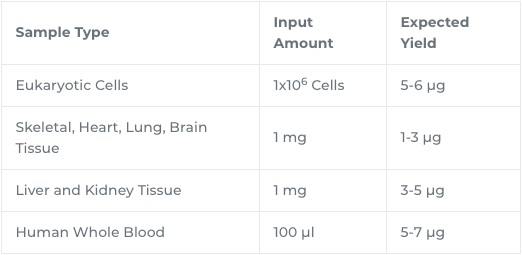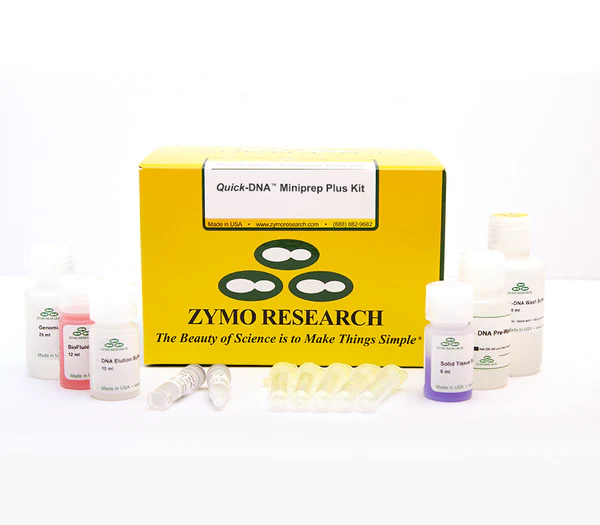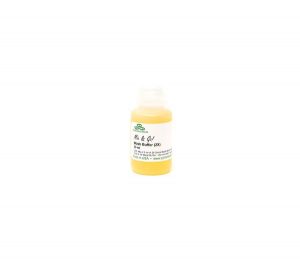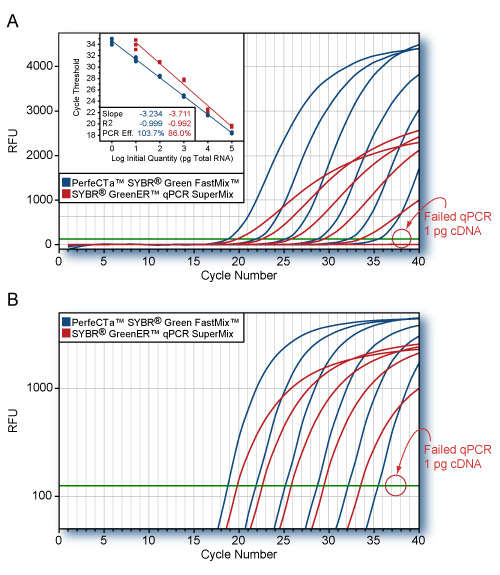Quick-DNA Miniprep Plus kit
| Cat# | Name | Size |
|---|---|---|
| D4068 | Quick-DNA Miniprep Plus kit | 50 Preps |
| D4069 | Quick-DNA Miniprep Plus Kit | 200 Preps |
Documents
Description
Highlights
- Quick & Easy: Simple 20 minute procedure.
- Highest Yield: Recover 3x more DNA.
- Ultra-Pure: Ready for qPCR, Next-Gen Sequencing, arrays, etc.
Description
The Quick-DNA Plus Kits are the easiest DNA isolation kits for high yield total DNA extraction (e.g., genomic, mitochondrial, viral) from cell culture, solid tissue, saliva, and any biological fluid sample. Innovative reagents and Zymo-Spin Technology allow for ultra-pure and concentrated genomic DNA (> 50 kb) to be eluted in as little as 35 µl. Zymo-Spin Columns ensure no buffer retention. Purified DNA is RNA-free,removing the need for RNase A treatments and ensuring accurate quantification for applications like library preparations. Isolated DNA is suitable for immediate use in sensitive downstream applications including qPCR, DNA-seq, arrays, and methylation analysis.
Elution Volume
≥ 35 µl
Equipment
Water bath or heat block (55°C), microcentrifuge, and vortex.
Purity
High quality DNA is ready for all sensitive downstream applications such as PCR, endonuclease digestion, Southern blotting, genotyping, Next-Gen sequencing, bisulfite conversion, etc. (A260/A230≥ 2.0).
Size Range
Capable of recovering genomic and mitochondrial DNA sized fragments > 50 kb. If present, parasitic, microbial, and viral DNA will also be recovered.
Workflow
Utilize a Proteinase K Digestion and Zymo-Spin Column for effective recovery of DNA.
Yield
The DNA binding capacity of the column is 25 µg. Typically, mammalian tissues yield: 1-3 µg DNA per mg skeletal, heart, lung, and brain tissues and 3-5 µg DNA per mg liver and kidney. Human whole blood will yield 3-7 µg DNA per 100 µl blood sampled.

Q1: What is the difference between the digestion buffers? Can one buffer be used for all sample types?
The BioFluid & Cell Buffer (Red) is designed to allow for rapid Proteinase K digestion with easy-to-lyse samples (e.g. mammalian cells and biological fluids). The Solid Tissue buffer (Blue) can be used for any sample type and requires a longer PK digestion time compared to using the BioFluid & Cell Buffer (Red).
Q2: What is the difference between Quick-DNA and Quick-DNA Plus kits?
The Quick-DNA is optimized for cells, soft tissues, and homogenized/digested samples using a single lysis/binding buffer. The Quick-DNA Plus kits contain an optimized Proteinase K for processing a wider variety of sample inputs, such as cells, blood, tissues, etc. The upgraded Quick-DNA Plus recovers more DNA with higher purity compared to the Quick-DNA Kits.
Q3: Can Proteinase K digestion be performed overnight in DNA/RNA Shield?
Yes, samples can be digested overnight. Make sure to follow the appendix (page 8 appendix B) for processing liquids samples in DNA/RNA Shield and incubate at room temperature.
Q4: I’m seeing some yield inconsistencies with my blood samples, what’s happening?
White blood cells, which are the major source of genomic DNA in blood, easily and quickly settles. Mix the blood sample well prior to aliquoting for purification.
Q5: Can the Quick-DNA Plus kit be used with bacterial samples?
E.coli cells are easy-to-lyse and can be processed directly with the Biological Fluids & Cells protocol. For an all-inclusive kit with any type of microbes (including tough-to-lyse), use any of Zymo Research’s Environmental Kits (e.g. Quick-DNA Fungal/Bacterial, Quick-DNA Fecal/Soil, ZymoBIOMICS DNA, etc.)
Q6: Can I use Quick-DNA Plus to clean-up previously isolated DNA?
No, the kit is designed for direct use with biological samples. For clean-up of previously isolated DNA, please use the Genomic DNA Clean & Concentrator or the DNA Clean & Concentrator kits.
Q7: What is the purpose of adding beta-mercaptoethanol? Can this step be substituted or omitted?
Beta-mercaptoethanol is a reducing agent that helps break down proteins and improves DNA recovery and purity. Addition of beta-mercaptoethanol is recommended to enhance sample lysis, but can be substituted with dithiothreitol (DTT, final concentration of 10 mM) or omitted.
Q8: Can Quick-DNA process crude lysates?
Yes, add 4 volumes of Genomic Lysis Buffer to 1 volume of crude lysate, homogenized, or digested sample (see Cell Suspensions and Proteinase K Digested Samples) and proceed with the remainder of the protocol.
| Cat# | Name | Size |
|---|---|---|
| C1001-50 | Collection Tubes | 50 Pack |
| D3004-2-50 | g-DNA Wash Buffer | 50 ml |
| D3004-4-1 | DNA Elution Buffer | 1 ml |
| D3004-4-10 | DNA Elution Buffer | 10 ml |
| D3004-2-200 | g-DNA Wash Buffer | 200 ml |
| D3004-4-50 | DNA Elution Buffer | 50 ml |
| D3004-5-50 | DNA Pre-Wash Buffer | 50 ml |
| D3004-5-30 | DNA Pre-Wash Buffer | 30 ml |
| D3001-2-20 | Proteinase K w/ Storage Buffer Set | 20 mg |
| D3001-2-5 | Proteinase K w/ Storage Buffer Set | 5 mg |
| D4068-1-12 | BioFluid & Cell Buffer (Red) | 12 ml |
| D4068-1-45 | BioFluid & Cell Buffer (Red) | 45 ml |
| D4068-2-22 | Solid Tissue Buffer (Blue) | 22 ml |
| D4068-2-6 | Solid Tissue Buffer (Blue) | 6 ml |
| D4068-3-25 | Genomic Binding Buffer | 25 ml |
| D4068-3-85 | Genomic Binding BuffeR | 85 ml |
| C1103-50 | Zymo-Spin IC-XM Columns | 50 Pack |
| C1104-50 | Zymo-Spin IIC-XLR Columns | 50 Pack |









